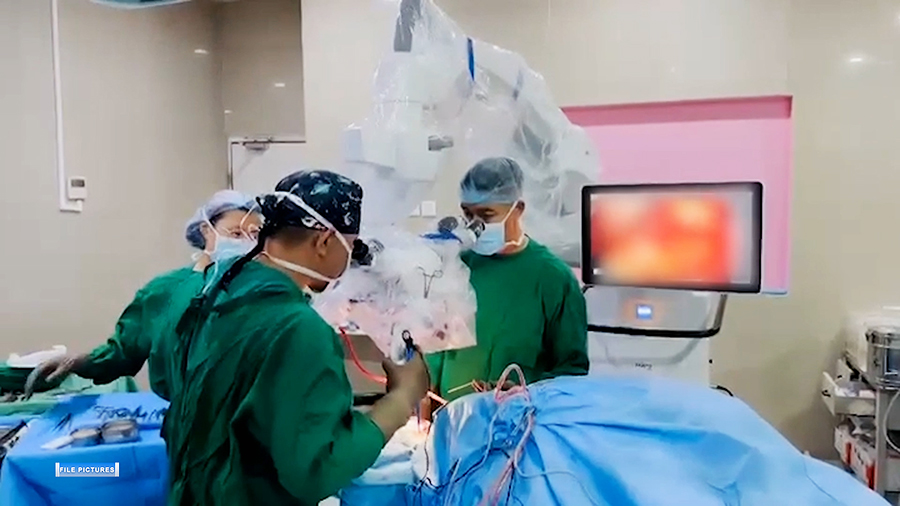 Following Bhutan’s first epilepsy surgery at the National Referral Hospital in September last year, over 70 surgeries have been performed so far. Epilepsy is a non-communicable disease which causes seizures. The surgery, which is performed on the patient’s brain, reduces or stops seizures caused by the disease.
Following Bhutan’s first epilepsy surgery at the National Referral Hospital in September last year, over 70 surgeries have been performed so far. Epilepsy is a non-communicable disease which causes seizures. The surgery, which is performed on the patient’s brain, reduces or stops seizures caused by the disease.
 26-year-old Sangay Pelden was the first patient to undergo epilepsy brain surgery in the country.
26-year-old Sangay Pelden was the first patient to undergo epilepsy brain surgery in the country.
She shared that the surgery was life-changing and has entirely stopped her seizures for the past four months. She has to take only one medicine instead of the three to four she needed previously.
“I can see a lot of difference. In the past, I had to get seizures about five to six times a week. But nowadays, I have no seizures,” said Sangay Pelden, a patient.
Likewise, 33-year-old Dorji Wangmo is one of the most recent patients to have undergone the surgery at the hospital.
She said her seizures were so severe that she had emotional breakdowns. She was diagnosed with epilepsy 13 years ago. Her seizures were so frequent that she would have it two or three times a week, even under medication.
She, therefore, tried various measures to control her seizures, but to no avail. Before her recent surgery in Bhutan, she had a similar surgery in July last year in India, but her seizure relapsed within 10 days.
“Doctor Sonam Jamtsho made me do an MRI, and he said I needed to completely remove my temporal lobe. So I decided to do it, considering the doctor’s advice. He has been supporting me till now. As long as you trust the doctor, you can go for it. The previous surgery could not stop my seizures, but now, I am feeling alright,” said Dorji Wangmo, another patient.
The Annual Health Bulletin 2024 recorded 1,587 cases of epilepsy in Bhutan.
Doctor Sonam Jamtsho, a neurosurgeon at the National Referral Hospital, said that after the surgery, a patient can gradually reduce the dosage of their medication after two to three years if they do not experience any seizures.
He has performed 25 major epilepsy surgeries to locate the sources of seizures in the brain. Additionally, he has conducted over 50 minor epilepsy surgeries, which are typically caused by tumours or the accumulation of fluid in the brain. He said the surgery is only recommended if a patient has repeated seizures despite taking three to four doses of strong medication.
“When it comes to major, we are talking about the brain, where we have a right and left temporal lobe. So, most of the time, the dominant brain is on the left side. So, this is a very deep CT structure. This causes intractable seizures, which cannot be treated medically. So, this falls into the category of a major surgery because you have a very high risk of causing the patient to lose vision, become paralysed, or sometimes, lose their memories,” said Dr Sonam Jamtsho, a Neurosurgeon at JDWNRH.
Currently, before the surgery, the patients are sent to India for an electroencephalogram (EEG) scan, Wada test and functional MRI to see the source of seizure. He said if such facilities are available within Bhutan, there is no need for referrals to India.
“In the near future, with such kind of equipment and a human resource, I need a colleague called a neurologist who would medically treat the seizure, and we can work together. In the near future, if this can happen, I am probably sure that we can do a lot of epilepsy surgeries and beyond epilepsy surgery,” added Dr Sonam Jamtsho.
He added that epilepsy surgery costs approximately 700,000 rupees in India, excluding accommodation and travel expenses. However, the procedure is free in Bhutan. He encouraged patients with severe, medication-resistant seizures to consult specialists at the national referral hospital about potential surgery.
Singye Dema
Edited by Kipchu









